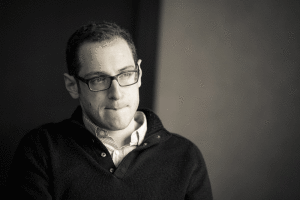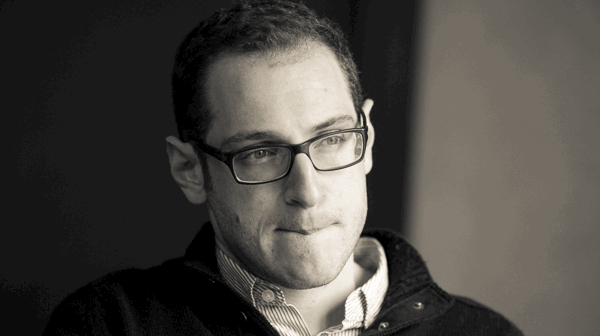 Omar Christidis is founder and CEO of ArabNet, a hub for digital professionals and entrepreneurs to connect and learn. We spoke with Omar about ArabNet and discussed what organizations are doing right and wrong in the digital space today.
Omar Christidis is founder and CEO of ArabNet, a hub for digital professionals and entrepreneurs to connect and learn. We spoke with Omar about ArabNet and discussed what organizations are doing right and wrong in the digital space today.
Key Learnings:
1. The way people do business in every sector is being disrupted by digital, and ArabNet is in a great position to enable people to interact and learn more about what’s going on in the sector.
2. In a market of economic challenges, people are going to become more and more in tune to the efficiency of their accounting and the effects of their internal investments.
3. There’s a huge investment in building digital capacity in general, and companies are learning that digital has to be the core of ad campaigns and that it has to be integrated with everything that the agency does.
4. We need to allocate more budget spending to digital marketing, though people have caught up in terms of awareness and strategy.
5. In the past, a lot of companies have been reluctant to implement digital strategy, and they’ve seen digital as the responsibility of the IT department. But in many industries, that has changed, especially in media and advertising.
6. Upper management of businesses needs to be more fully aware of other companies (often startups) that are threatening to capture market share from them in unrelated industries.
7. Digital needs to go from the IT department to the boardroom, and we are seeing organizations starting to think strategically about rolling out digital activities or implementing digital platforms.
8. There’s going to be a big opportunity for digital entrepreneurs to use the industrial Internet to build applications for the mountain of data that’s going to come from governmental initiatives.
9. The digital space is changing so quickly, and if you take a passive or a cautious approach, you’re going to miss a lot of opportunities. So, you must try things, you must be willing to take risks, try new platforms and invest in things.
Interview:
AS: This is Amin Shawki, Regional Managing Director at InfoTrust in the MENA region. Today, we have Omar Christidis joining us. He is the CEO and Founder of ArabNet, one of the most recognized and respected digital organizations here. Thank you so much for joining us, Omar.
OC: Thank you for having me.
AS: Absolutely. We’re very excited to get your perspective on the digital industry, especially in this region. How do you introduce yourself and ArabNet to someone that’s new to MENA?
OC: ArabNet is a leading event and media company, focused on the digital market. We organize some of the biggest annual conferences for digital executives, decision makers and entrepreneurs in Beirut, Lebanon, Saudi Arabia, Dubai and the UAE. We bring together over 1,000 attendees and speakers to teach and cover a broad range of topics, including digital media, advertising and mobile apps. We also cover businesses, healthcare and digital healthcare, digital finance, innovation and everything in between.
In addition to that, we are a media company. We publish a magazine on a quarterly basis and have done a couple of research reports, the first focused on digital banking apps. We surveyed 2,500 customers about their download habits, their payments and the kinds of apps they’re interested in using. The second was a report on investments and startup amenities. We gathered information on over 400 deals that took place in the last three years with over $700,000,000 in investments. We presented our findings to the industry to help clarify where investments are going, what size of deals are being made, where the investors are located and how the ecosystem is evolving.
AS: Very nice. That’s certainly a lot of content and a lot of time investment to pull it all together. What inspired you to create ArabNet?
OC: I was actually an accidental entrepreneur. In 2008, before I started ArabNet, I worked in finance in New York as an MBA consultant. Once the financial crisis happened, I lost my job, as did many of my peers. I always knew my heart wasn’t in finance or consulting; it was always in digital innovation and start-ups. I traveled back to the region where I grew up to start looking for jobs and found that there were actually very few places where I could find information or connections in that space. So, I decided there had to be a place to enable people to come together to connect and learn about what’s going on in the sector, and that’s what drove me to start ArabNet. Initially, I think people thought we were a little bit crazy because the sector was so young and wasn’t as big in the East as it was in the US and Europe. Big corporations hadn’t moved into that space yet. I remember going into companies for sponsorship and telling them that they should be on Twitter, and they looked at me and said that those platforms are for kids.
The world has changed since then. Digital has enabled businesses to reach customers via sales, customer service, product development and crowdsourcing. The whole value chain and the way people do business in every sector is being disrupted by digital, and we’re now in a great position in our region. We see tremendous interest now across both the private sector and the public sector, and in the government in particular. Being able to explore cost-effective oil has helped to shape economic development strategies in the region. A lot of people are looking at investing in entrepreneurship and job creation. So, we are looking to grow beyond Saudi Arabia, Lebanon and UAE. In the next few years, we’d like to expand into Egypt, Morocco and Kuwait, and we’d like to build a broader regional ecosystem and connect people in different markets.
AS: That’s great. There’s definitely a boom in the region. It’s one of the emerging markets in the world, as far as digital adoption. So, we clearly see digital gaining momentum with all types of different organizations and businesses. Within digital, do you think data analysis is also picking up, or is it still behind the more established markets?
OC: Whether you’re talking about analyzing problematic buying or measuring a campaign’s conversion rate, analytics is core to digital marketing. I think especially in a market of economic challenges, people are going to become more and more in tune to the efficiency of their accounting and the effects of their internal investments. Companies like GE especially are going to be interested in analysis in order to optimize things like fuel efficiency, etc. At the end of the day, everyone wants to increase the bottom line, and analytics is a great tool to help do that. I think we’re going to see increased interest in the field across the board as people start to see the value of it.
AS: Awesome. Since ArabNet is the go-to organization for digital insights and trends, you get to meet some of the biggest players in this space. What are top organizations doing well in the digital space here in MENA?
OC: I think that everyone is investing in digital today, and people are really trying to figure out how to hire for digital. There are not enough experienced people who have worked in digital for 10 or 15 years, and people are even pulling in talent from outside their regions to build out their digital teams. There’s a huge investment in building digital capacity in general, so that’s one thing that people are doing well. For a while, people were moving toward building independent digital arms or putting digital in a separate agency, which has also changed. People are learning that digital has to be core to ad campaigns and that it has to be integrated with everything that the agency does. There is more testing and digital integration, and new initiatives are being launched all the time. You see banks like Gulf International Bank of Saudi Arabia building a fully online, virtual bank and using social media to sort ideas for product development and to build a customer base and testers. Initiatives like this indicate that people are willing to try numerous types of work and put out new product for the agency consumer.
AS: Excellent. Do you see any areas that these organizations could improve? What could organizations do differently when it comes to implementing digital?
OC: I think we need to allocate more budget spending to digital marketing, though people have caught up in terms of awareness and strategy. In the past, a lot of companies have been reluctant to implement digital strategy, and they’ve seen digital as the responsibility of the IT department. But in many industries, that has changed, especially in media and advertising. There are some industries that are still behind, depending on the market. I think senior management could be more aware of the deep disruption that’s taking place in their own industries. If you look at the banking sector today, for example, they’re investing heavily in online banking, mobile banking, mobile payments, and innovation. But at the level of the CEO or the board, I don’t think that they are fully aware of other companies that are threatening to capture market share from them in unrelated industries. Because there are non-banking digital and financial startups that offer lending, savings or payment transfer solutions. These companies are young and disruptive, and senior management needs to stay on its toes to watch out for them, because they are major competition now. But I do think the more traditional sectors are catching up as we speak.
AS: Looking ahead at 2016, what do you think is the biggest theme for organizations in this region when it comes to digital?
OC: The phrase that I use all the time is “digital transformation.” Digital needs to go from the IT department to the boardroom, and we are seeing organizations starting to think strategically about rolling out digital activities or implementing digital platforms. They’re starting to see how it empowers their sales teams to do their jobs better with real-time data and information about client support. Customer service over social media is another area where we’re seeing big corporations building large teams right now. That kind of enterprise-like digital transformation is what we’re going to see more and more of in 2016, and it’s going to be driven by some of the big companies that work with these corporations. The other thing we are going to see a lot of is the idea of the “smart state, smart government, smart city.” It’s been a big topic, but it’s going to only get bigger. Dubai hosted the world’s government summit, and governments are now investing tremendously in smart cities and smart government. There’s going to be a big opportunity for digital entrepreneurs to use the industrial Internet to build applications for this mountain of data that’s going to come from those initiatives.
AS: To wrap up, if you were to give one piece of advice to an aspiring digital marketer or organization that wants to be successful in digital, what would your one piece of advice be for them?
OC: You know, I only recently started using Snapchat. I wondered what the fuss over it was for a long time, and I finally tried it and got really excited about it. And that made me decide that I really have to invest time into being up-to-date on new technologies. That, for me, means trying the new channels when they launch and experimenting with them, both personally and professionally. This space is changing so quickly, and if you take a passive or a cautious approach, you’re going to miss a lot of opportunities. So, you must try things, you must be willing to take risks, try new platforms and invest in things. You’re going to make mistakes, and companies are constantly afraid of social media disasters, but people are pretty willing to forgive you if you’re honest and you can admit what you did wrong. It’s actually endearing to consumers to get a heartfelt apology from a corporation or individual. So, don’t be afraid of experimentation. It’s critical that you don’t miss the boat on the next big platform that’s coming up.
AS: Absolutely. We see organizations starting to build digital innovation teams that are designed just to experiment, test and explore new opportunities with digital. Of course, one other key takeaway as far as experimentation is to follow ArabNet, because they’re always on top of all the latest trends and technologies.
OC: Thank you! One more point: whenever you’re experimenting, you should measure it, because you’ve got to figure out what works and what doesn’t. That brings us full circle back to the importance of data and the importance of analytics and measurement.
AS: Music to my ears. Thank you so much for chatting with us today, Omar.
OC: Thank you for having me. If you’re interested, check out our site to learn about the latest digital news and to get information on the next ArabNet event.
AS: Absolutely; I highly recommend it. We’re personal attendees and past speakers at ArabNet Conferences. They’re awesome, and they’re definitely the place to be for networking, education and to get involved more with the digital industry here in the region. ArabNet’s definitely leading the way. Thanks again, Omar.


